Even in Darkness, Jewish Camp Reminds Us to Pursue Joy
This article was authored by Jeremy J. Fingerman and published by The Jewish Journal. Click Here to read the original version.
From Israeli hostages remaining in captivity to the rising fever of global antisemitism, the heartbreak of Oct. 7 and the days since feels endless. We cannot ignore this pain. But neither can we let ourselves drown under its weight. Now is the time to embrace joy, and the hundreds of Jewish camps in full swing across North America are teaching us how.
Right now, over 180,000 campers and counselors are filling their days with fun and friendship, creating Jewish memories that will last a lifetime. I know this because 50 years ago this summer, in Wisconsin’s remote northern woods, I began to forge my Jewish identity in a camp community infused with Jewish joy.
At Camp Ramah in Wisconsin, I felt embraced at Friday night services on the shores of Lake Buckatabon, where golden sunsets refracted off the water, through the pine trees, and carried our community into Shabbat. I whispered, laughed, confided, and cried in the sacred space of my bunk. In that spartan wooden cabin, I met some of my closest friends, including one who, more than 49 years later, recently celebrated with me at my grandson’s bris.
I recognize that this summer isn’t normal. All of us, and all of our camp communities, continue to struggle with the trauma and grief that began on Oct. 7. Many of the over 25,000 college students serving as counselors have experienced antisemitism on campus. Close to 3,000 Israeli shlichim and displaced Israeli teens are spending time at camp after a long stretch of war.
Yet camp proves that we can pursue joy in tough times without denying that times are tough. As young campers in the mid-70s, my friends and I weren’t immune to the turbulence of Vietnam, the Yom Kippur War and Watergate, just as today’s campers aren’t immune to the world around them. But camp provided me with a reprieve, a function it’s serving for young Jews today even after Oct. 7.
Early reports from this summer reveal that camps are effectively navigating their roles as places to have difficult conversations, communities of in-person connections, and bubbles that offer respite. Little of the tension and rancor of campus has spilled over into our camp communities.
Camps aren’t just showing us the power of joy. They’re teaching us how to pursue it: by disconnecting from technology and the news and connecting to our creativity and one another.
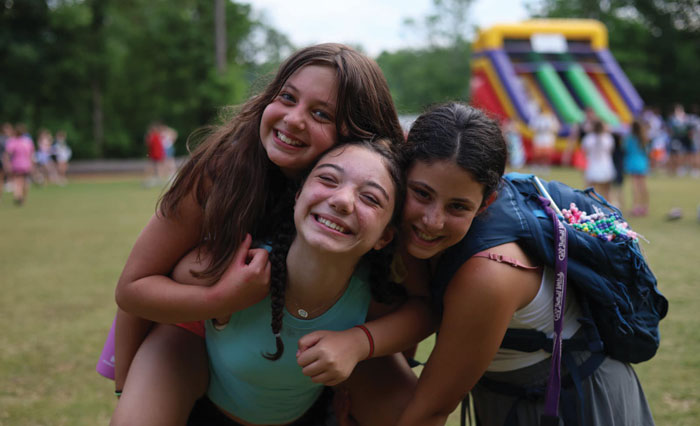
My experience at camp was tech-free because in the 1970s, there wasn’t much tech from which to be free. But even today, camps are dialing down the noise of the outside world. They’re acting as islands of in-person interaction where young people addicted to screens can rediscover their attention, directing it inward toward their feelings or outward toward people and nature.
Like Shabbat, camp reminds us that disconnecting does not mean disengaging from community. It’s the opposite: we disconnect so that we can be more present with loved ones. In this regard, Jewish camps reveal and model the importance of sacred, communal spaces.
Over the past nine months, many Jews and Israelis have been mocked or dismissed for bringing up their pain, no matter their politics on Israel. These young people, like all of us, need opportunities to heal around people they are confident will accept them. Camps have long reported that shared Jewish identity enables campers and staff to explore complex emotions and opinions in a way they can’t anywhere else — and the same has been true this summer so far.
In a time of communal crisis, camps are also reaffirming that sometimes we need to remove our fingers from the pulse of the world’s trauma. Instead, we can listen more closely to our breathing and the birds by the lake. We can cheer and stomp in frenetic song and dance sessions. And we can step into new roles that expand our character, whether it’s growing as a communal leader or discovering a love of theater, both of which I took part in as a camper 50 years ago.
In their emphasis on tech-free spaces, the wonders of nature, in-person community, and fun activities such as sports, ceramics, hiking, sailing, and drama, camps provide a roadmap for pursuing joy, especially in difficult times. This isn’t a joy that papers over our problems. Rather, it replenishes the strength we need to tackle them.
On National Camp Kindness Day, Foundation for Jewish Camp Spearheads Research to Help Transform Young People into Empathetic Leaders
NEW YORK — As summer camps across the country spotlight kindness during this year’s Camp Kindness Day, Foundation for Jewish Camp (FJC) is spearheading research to help camps transform young people into compassionate leaders. In summer 2024, FJC provided grants of approximately $15,000 to five camps to join the second cohort of its Character at Camp Initiative.
Character at Camp is a three-part initiative combining research, programs, and communication to further understand how Jewish camps develop young people’s character and provide resources that empower camps to expand on their existing success. Run by FJC and funded by a generous grant from the John Templeton Foundation, the initiative began with a landscape survey of 120 camps in FJC’s network to understand which character strengths Jewish camps emphasized most. One trait stood out in particular: Kindness.
“Kindness, or chesed, is a core Jewish value that’s woven into every aspect of the camp experience — from programming to informal interactions in bunks,” said Jeremy J. Fingerman, CEO of Foundation for Jewish Camp. “On Camp Kindness Day, FJC is proud of all the work the more than 300 camps in our network do to develop young people’s character, and are excited to build on that success through the second cohort of our Character at Camp Initiative.”
The camps in the second cohort are spread out across Pennsylvania, California, Georgia, and Canada and include BB Camp (Manitoba), Camp Havaya, Camp JCA Shalom, Camp Mountain Chai, and Camp Barney Medintz. Character at Camp funding supports various initiatives at these camps, including camper, family and staff surveys, staff remuneration, and the integration of additional leadership roles for staff to be ambassadors of character development practices.
“We’ve known from multiple sources that Jewish camp offers a transformative experience for young people. But Character at Camp is enabling us to dig deeper and understand how camps nurture young people’s growth,” said Nila Rosen, Director, Learning and Research at Foundation for Jewish Camp. “By studying how camp experiences and camp relationships influence youth development, we are gaining new evidence about the importance of camp and the practices at camp that nurture the growth of compassion and kindness.”
Last summer, at URJ Crane Lake Camp, campers and counselors worked on a Kindness Mural Project, splashing “Spark Kindness” in bright orange letters. At Camp Ramah in Wisconsin, one camper spoke of a culture of mutual support — from assisting each other with Torah readings to cheering on friends at basketball games. A group of “Virtue Ambassadors” at Camp Laurelwood suggested that they “observed moments of kindness every day, in every place at camp.”
At FJC’s 2024 Leaders Assembly, which will take place December 9th to December 11th in Chicago, the Character at Camp Initiative plans to reveal the latest data on character development and to release a short documentary led by filmmaker Hannah Roodman, featuring footage from one of the camps in the initiative’s second cohort. Next year, FJC’s Character at Camp Initiative aims to publish data and findings in a peer-reviewed journal.
###
About Foundation for Jewish Camp
FJC advocates for over 300 day and overnight camps that provide nearly 180,000 campers and counselors each summer with a meaningful, personal, and lifelong connection to Judaism. FJC is the only public 501(c)(3) charitable organization solely focused on Jewish camp. jewishcamp.org
Media Contact
agoldstein@ninetywest.com for Foundation for Jewish Camp
Secure Community Network & Foundation for Jewish Camp Launch Comprehensive Camp Security Initiative
FOR IMMEDIATE RELEASE: April 19, 2024
CHICAGO, IL – The Secure Community Network (SCN) and Foundation for Jewish Camp (FJC) today announced a new initiative to enhance the safety, security, and resiliency of Jewish camps across North America. This groundbreaking initiative will jointly leverage SCN and FJC’s expertise and networks to deliver a national camp security program that ensures best-practice guidance, trainings, and other resources to ensure a safe and secure environment for campers and staff.
To launch the initiative in preparation for this summer’s camp season, SCN will host regional security workshops for all participating camps starting in early May, working collaboratively with Jewish Federations and other partners in the camp environment. These virtual workshops, led by SCN’s Regional Directors and the national network of Jewish security professionals, will provide camp leadership with essential tools and knowledge needed to continue enhancing their security preparedness.
Building on existing relationships and partnerships with various camp movements, throughout the 2024 camp season and in years to come, SCN, FJC, and the camp movements will ensure updated points of contact, provide guidance materials, conduct staff training, perform walkthroughs and threat, vulnerability, and risk assessments (TVRAs), and offer support to help camps navigate the Nonprofit Security Grant Program (NSGP) to secure funding that helps harden their facilities against attack.
To lead this critical Camp Security Initiative, SCN is welcoming Jim Tarasca as its Director. Tarasca brings extensive experience in security management, having most recently served as the Special Agent in Charge of the FBI’s Detroit Field Office after serving in various roles over a 25-year career in the FBI, including his role as assistant special agent in charge of the Counterterrorism Division of the New York Field Office and the Joint Terrorism Task Force.
This position is funded in full by a challenge grant offered by the Jack, Joseph and Morton Mandel Foundation and an anonymous donor. Both funders care deeply about the future of Jewish camping and understand security is essential to the success of camps, particularly in a post-October 7th threat landscape.
“We greatly appreciate SCN’s increased efforts and investments to support our field, especially in preparation for the upcoming summer,” said FJC CEO Jeremy J. Fingerman. “Connecting Jewish camps to SCN’s Regional Security Directors – in addition to local Federation security programs – offers them access to expertise and resources that will make a meaningful difference for camp security and safety this summer.”
“We are thrilled to collaborate with FJC on this critical initiative as well as other partners – from individual camps to our Federations,” said SCN National Director & CEO Michael Masters.” By working together, we can build upon our successful track record of enhancing safety and security measures in Jewish communities across the country and extend that level of protection to both day and overnight camps to ensure campers can focus on being campers.”
Since 2021, SCN has directly supported dozens of camps and helped Jewish camps secure over $2.1 million in NSGP grants. The Camp Security Initiative represents a significant expansion of these efforts. For more information about the Camp Security Initiative and how to get involved, please contact the Secure Community Network or Foundation for Jewish Camp.
# # #
About Secure Community Network: The Secure Community Network (SCN), a 501(c)(3) nonprofit, is the official safety and security organization of the Jewish community in North America. Founded in 2004 under the auspices of The Jewish Federations of North America and the Conference of Presidents of Major American Jewish Organizations, SCN serves as the central organization dedicated exclusively to the safety and security of the American Jewish community, working across 146 federations, 50 partner organizations, over 300 independent communities, and other partners in the public, private, nonprofit, and academic sectors. SCN is dedicated to ensuring that Jewish organizations, communities, life, and culture can not only exist safely and securely, but flourish. Learn more at securecommunitynetwork.org.
About Foundation for Jewish Camp: Foundation for Jewish Camp (FJC) fosters excellence and accelerates innovation at 300+ Jewish day and overnight camps across North America by developing adaptive talent, deepening immersive learning experiences, and driving field growth. FJC supports camps in their effort to provide a lifelong connection to Judaism and elevates Jewish camp on the cultural and philanthropic agenda. Learn more at jewishcamp.org.
Contact:
- Wyatt Ronan | wronan@securecommunitynetwork.org | 646-248-2522
- Aimee Lerner | aimee@jewishcamp.org | 646-278-4518
Foundation for Jewish Camp Brings Camp Professionals to Israel for Firsthand Insights
Camp professionals from across North America engage with a Post-10/7 reality
[Israel] — At the end of February for two weeks, nearly 50 Jewish camp professionals, along with Foundation for Jewish Camp (FJC) staff members, embarked on an educational trip to Israel organized by FJC, in partnership with The Jewish Education Project.
Camp leadership came to bear witness to the impact of the events of October 7th and their aftermath, including meeting with Israelis directly impacted by the attacks, alongside shlichim (emissaries) and members of the Jewish camp community in Israel.
“We want camps to see the landscape in Israel and that region and the significant impact since 10/7. By sending camp directors during this time of great conflict, FJC aims to foster understanding, promote education, and build connections between communities,” Jamie Simon, FJC’s Chief Program Officer, explains. “We hope to provide a first-hand perspective allowing camp directors to create programs, enhance dialogue, and uncover learning opportunities for their summer camps and the thousands of children they will serve.”
One of the primary goals of the trip is to provide camp professionals with the necessary skills and confidence to navigate conversations about Israel today. By connecting with those living in Israel, camp professionals will be better prepared to inspire and engage their camp communities with authenticity and empathy.
The connection of Jewish camps to the events in Israel cannot be understated. Camps host thousands of Israeli shlichim and campers each summer. Multiplied over decades, the connections run very deep. Indeed, the trip aims to highlight the role of Jewish camps in the broader context of global Jewry. Through meaningful interactions and observational learning, camp professionals will gain a deeper appreciation for their camps’ potential to foster connections and cultivate a sense of belonging while explaining the ways of the global Jewish community.
“Foundation for Jewish is committed to supporting the camps beyond this experience,” Simon said. “Through education, partnerships and grant making, we are working with camps so they have the resources they need to be successful this summer.”
The Jewish Educators Trips to Israel is seeded through a generous grant from The Jim Joseph Foundation and is powered by The Jewish Education Project and The iCenter in collaboration with The Jewish Agency. FJC was able to secure support from the UJA, and an anonymous donor to make sure all camp professionals would be able to take this important excursion.
About the Foundation for Jewish Camp
FJC advocates for over 300 day and overnight camps that provide nearly 180,000 campers and counselors each summer with a meaningful, personal, and lifelong connection to Judaism. FJC is the only public 501(c)(3) charitable organization solely focused on Jewish camp. https://jewishcamp.org/
About the Jewish Educators Project trip For over 100 years, The Jewish Education Project has been supporting educators to build strong Jewish communities. Originally The Board of Jewish Education, The Jewish Education Project provides professional development and other resources to educators in early childhood centers, congregations, day schools and yeshivot, youth programs, and emerging spaces. https://www.jewishedproject.org/
Happy Campers
Camp matters. Jewish camp matters.
It sounds like an obvious idea, elegant in its simplicity, but like most elegant, simple ideas, it took a very long time for anyone to realize it.
In the beginning, a century or so ago, Jewish camping had been something that generations of Jewish parents had used to provide their children, most of whom were growing up in cities, with an escape to the country, to become Americanized, to have a chance to breathe, and to give their beleaguered parents a chance to breathe too. It was more or less a fresh air camp for Jews; the point was not to stress their Jewishness but to teach them how to escape it, or at least to cordon it off.
Over time, that changed.
A history of Jewish camps in North America can trace the way those camps adapted to the Depression, the post-World War II world, and the vast societal changes that followed, faster and faster and terrifyingly faster. But there’s one part of that change we’d like to focus on now. It’s the change that we can trace to the efforts of one couple, Elisa Spungen Bildner and Robert Bildner of Montclair.
The Bildners were honored last month not by a Jewish organization — certainly the couple has been showered with recognition by Jewish groups— but by a more general camp-world body, the American Camp Association. They were given the Hedley S. Dimock award for “their extraordinary leadership, generous philanthropy, and significant impact on the field.”
“We’re happy to have received the award, but what is remarkable to us is that a non-Jewish organization took an interest in Jewish camp and seemed to understand the power of camp as a way to transmit values — in this case, Jewish values,” Ms. Bildner said.
“We understand that faith-based camping has not been growing — but Jewish camping in contrast, has been,” Mr. Bildner said. “A wonderful aspect of this award is that it is a recognition that we are doing something important.
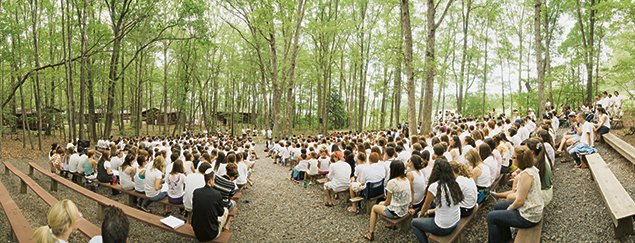
(A note: The camping world classifies Jewish camping as belonging to the faith-based part of the movement, although faith is just one of the criteria involved in Jewish camping, and its importance in relation to culture and other kinds of Jewish identity varies from camp to camp.)
“There are so many kinds of camps in this country — Boy Scout camps, all sorts of secular camps — that emphasize so many different kinds of skills, sports, and interests, and Jewish camp is a subset of that,” he continued. “A camp that promotes a cultural and religious identity as we do is singular. It is different.
“When campers are playing baseball or tennis or in arts and crafts, it is all infused with Jewish values and ethics.”
On the other hand, he said, “Jewish camp also is camp, and we strive to improve the camps as camps per se.”
Both Bildners are gratified by the award because “it’s recognized the leadership of the Foundation for Jewish Camp, which over the last 25 years has brought together families, professionals, funders, and the Jewish community in general to recognize how important camp is to our Jewish future,” Mr. Bildner said.
“Jewish camp is one of the institutions that obviously is working,” he added. “And it’s had an extraordinary result, bringing together hundreds of thousands of campers and families, and raised many millions of dollars for professional training and for the camps themselves.”
So that’s where Jewish camping is now. How did it get there? And what do the Bildners have to do with it?
Elisa and Rob Bildner grew up in different parts of the Jewish world. “I’m a product of Ramah Wisconsin,” Ms. Bildner said. “From that camp, I have an appreciation for camp, a real fondness for it.” Mr. Bildner, who is from West Orange, is the son of Joan and Allen Bildner, the CEO of Kings Supermarkets; his parents also founded Rutgers University’s Allen and Joan Bildner Center for the Study of Jewish Life and were major and active philanthropists whose generosity funded many local programs and institutions. He went to a camp that “was filled with Jewish campers and counselors, but it was not Jewish.”
They both loved camp. She was able to get an appreciation of Jewish life from the experience; he was not, but he had a lot of fun there and appreciated its seductive charms. Both felt camp’s immersive atmosphere, where friendships matter immensely, and the outside world doesn’t particularly loom.
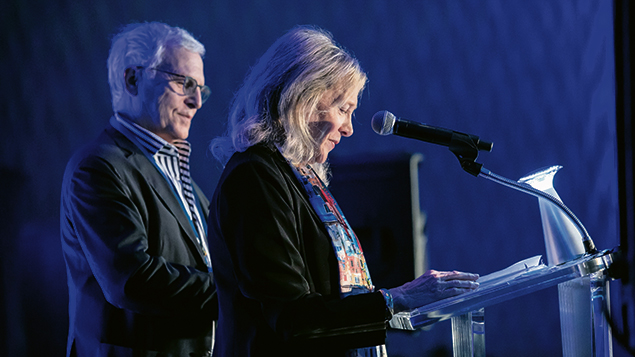
When they married and had children, the Bildners sent them to Camp Ramah in the Berkshires.
In 1990 or so, both Bildners were Wexner Fellows, selected to be part of a group of Jewish lay leaders, people with clear leadership potential, who were trained and challenged as leaders. “We came away from that program imbued with the idea that we were all charged with doing something specific to improve Jewish life,” Ms. Bildner said.
“Rabbi Herb Friedman, of blessed memory, who set forth that charge, talked about how often institutions are created in the Jewish community, but they don’t necessarily excel. Our challenge was to look at the institutions and decide who we want to work with to help.
“We’d both had very good experiences at camp, so when we drove away from that conference, we looked at each other and talked about how camp is a tremendous way to inculcate a love for Jewish life,” she said. “We were disappointed with the quality of some of the aspects of Jewish camps.”
“Jewish camping hadn’t been in the spotlight for a long time,” Ms. Bildner continued. “There are many portals into Jewish life, but we felt that not that many people recognized how important camp could be. That’s not to say that there wasn’t great work going on in camps, but there wasn’t a lot of funding for them, and there wasn’t a lot of interaction between them, except within the denominations.” If one camp came up with a good idea, that idea was not shared.
They talked to their friend Skip Vichness, who later became the chair of the Foundation for Jewish Camp. Like the Bildners, he lived in Essex County and was very active in local and national Jewish life and philanthropy. “He was the well-known owner of private secular camps,” Ms. Bildner said. “When he became chair, he said that when Jewish families decide to send their kids to Jewish camps rather than to his camps, he’d know that the foundation had achieved what it wanted — for the camps to excel.”
“We found that many of the camps were not excelling,” Mr. Bildner said. He was surprised by the lack of communication between them. “When we convened the field, we assumed that everyone would know each other,” he said. “But they didn’t.”
Jewish camp “wasn’t seen as an entrée into Jewish life, so little philanthropic money was going into them, except from selective donors,” Ms. Bildner said.
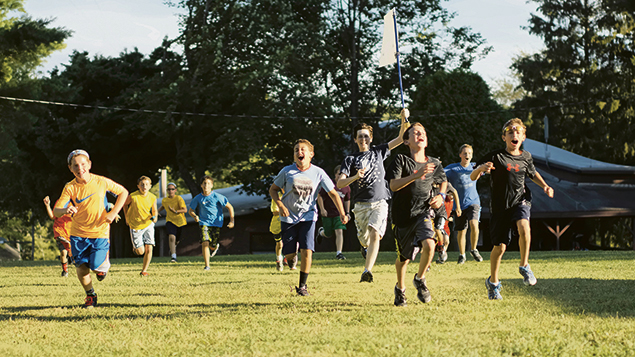
“Early on, we had several potential donors come to some of the Ramah camps,” she continued. “They were interested in camp as a route to Jewish education. They came into the camp, saw some people doing Israeli dancing, heard a discussion of some political issues involving Israel, saw some signs in Hebrew. It was lunch time. We said, ‘Let’s have lunch in the chadar ochel.’” The dining room. “They said, ‘No. We’re leaving. We don’t see any education here. We just see Jewish kids having fun in the woods. This is not education.’”
So they had to confront the idea that fun and learning are mutually exclusive.
“Our mission was to motivate people to see Jewish camp as a transformative experience,” Mr. Bildner said. “To get federations and philanthropists to establish the foundation and professional teams.”
In 1998, they established the foundation, after figuring out ways to appeal to donors and make clear that fun and transformational experiences can happen at the same time, in the same place, because often they’re the same thing.
“We’d like to shout out to Edgar Bronfman, because he was one of the first founders to say that he was in,” Mr. Bildner said. “In terms of getting attention in the Jewish community, it is important to attract some of the key large donors. And we also want to shout out to the Jewish Funders Network — I’m a past chair, but also because of who we met through that group. And although it took a lot of work at first to convince the Avi Chai Foundation, they embraced Jewish camp and commissioned academic studies to document the impact.”
After many meetings with many donors, visionary and otherwise, the foundation was established, and Jewish camping began to take off.
The foundation now supports more than 300 camps across North America. From the beginning, it “encompassed camps at all ends of the Jewish world,” Ms. Bildner said. “When we first started, we gave relatively small grants. We looked at each camp and saw what it needed.
“We are an enormous tent. We range from the very far left to the very far right, from Chabad to the Workers Circle, with camps from every denomination. When you go to one of our leadership meetings, you see the most Orthodox to the most secular.
“Many years ago, we were at a secular Jewish camp. It was entirely nonreligious. We saw that the bunks were named for Jewish heroes. They lit candles on Friday night — but they didn’t call them Shabbat candles. Their activities were not at all religious, but they were very cognizant of Jewish history and culture, as was reflected in the bunk names.
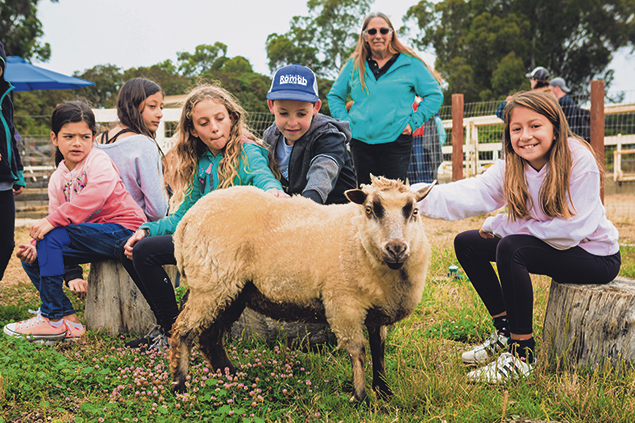
“As we were leaving the camp, a woman came running after us with a huge black portfolio, and she gave it to us. She said, ‘I’m sure you won’t give us money, but this is my master’s thesis about the power of Jewish camp. I will tell you that given my family, there is no way that I would have considered myself Jewish but for Jewish camp.
“The camp got the grant.”
The Bildners are particularly proud of the FJC’s One Happy Camper program, which gives a scholarship to a child going to Jewish camp for the first time. There are no means tests for that scholarship.
Paying for camp always can be a challenge for families who want to send their children but can’t afford it; the foundation works on creative ways to help. “We take on the challenge to find the funds for every Jewish family who otherwise could not afford camp,” Mr. Bildner said.
The foundation also has established a leadership program for camp directors, assistant directors, and counselors. Its range of programs, listed on its website, jewishcamp.org, is astoundingly wide-ranging.
“We have to make the field aware that we have to support the umbrella movement” — the Foundation for Jewish Camp — “as well as local camps,” Ms. Bildner said. “They are not in conflict with each other.
Even before the pandemic, children and teenagers were dealing with increased levels of mental health challenges, most likely caused at least in part by the new pressures posed by social media. Camps were affected by those challenges. They were severely affected by the pandemic, which forced kids inside, spending time alone staring at their images on their screens and considering how they couldn’t live up to their assumptions about how much better everyone else was than they were.
Camps also were affected financially by the pandemic; even nonprofits need income, and no campers means no money coming in. “The foundation has raised money to provide mental health professionals and find therapists,” Mr. Bildner said. “But for the Foundation for Jewish Camp, there would not be any Jewish camps after the pandemic,” Ms. Bildner said. “Without help, many camps would have folded.”
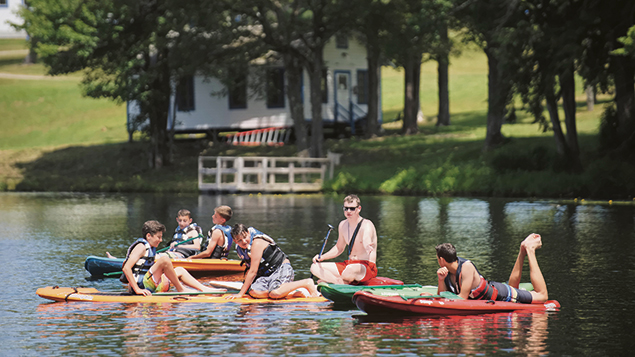
“When we started the foundation, there was no central address, no leadership, no spokesperson for the camps,” Mr. Bildner summed up. “That is what the foundation has become.
“During the pandemic, we focused on the foundation to keep Jewish camping alive. Now we have to look at the issues, from security to education to the challenging conversations about Israel that every institution in the Jewish world is having.”
“Jewish camp is a moving target, just as Jewish life in general is now,” Ms. Bildner said. “Of course Israel is on the list, along with mental health. And we know that the secular world offers a lot of things that Jewish kids want to do over the summer, so we have to do extraordinary things to attract them.
“That’s specialty camps,” Mr. Bildner said. “In 25 years the foundation has done some amazing programs.”
Camps have to be marketed, the couple said. “How do we compete with the market?” Ms. Bildner asked. “We can’t be off in our corner. We have to be cognizant of what the market offers, and be equal if not better than it.”
It helps that they come from the business world, and that Ms. Bildner is a lawyer. “We are very conscious of how we engage with customers to get them to change their behavior,” Mr. Bildner said. “We have always looked at camp through that lens. It is a market. We have to identify what young people are looking for.
“Jeremy” — that’s Jeremy Fingerman, the foundation’s CEO — “was the CEO of Campbell Soup,” he continued. “When we look at potential board members, we look at it as we’d look at a board in a for-profit company. What can someone bring that would move the needle?”
Jeremy Fingerman, the foundation’s CEO, lives in Fort Lee. He went to the foundation after a successful career as a business leader, culminating in his leadership of Campbell Soup and then of Manischewitz. He’s also a former Jewish camper, the father of Jewish campers, and deeply involved in Jewish life. His job at the FJC is the logical endpoint for his training, knowledge, convictions, and passions.
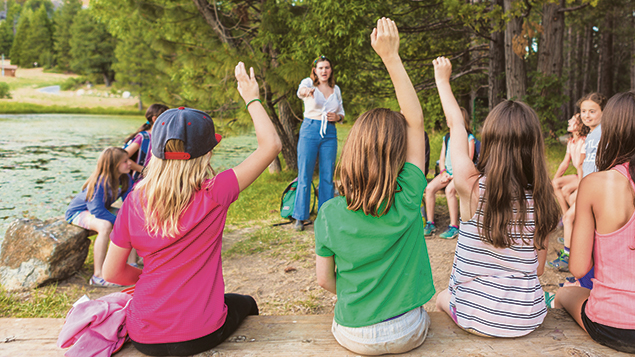
He is deeply impressed by the Bildners’ work for Jewish camp. “The JFC basically became their fifth child, which they nurtured and nourished,” he said. “In the early days, they carried FJC, and then they got Edgar Bronfman and the Avi Chai, and then the momentum started.
“Most founders completely step away from the organizations that they start,” he continued. “Elisa and Rob have continued their generous philanthropic investment for 25 years now. That doesn’t happen often. And they continued to make connections and to advocate for the field.
“The Bildners stayed with the foundation not as chairs, but because it is their child. I remember that when we celebrated FJC’s 18th anniversary, I said, ‘Your child is getting to be an adult,’ and we laughed. In the early days, their child needed more attention from them. As it went into its teens, it became more self-sufficient, and now at 25 it is self-sufficient, but it still has a connection to its parents. And the parents are proud of it.
“Their presence enriches the work of the foundation. It gives it history. The Bildners got recognition for the field, and the people who have worked in the field for many years know that there was no field before they unified and galvanized it.”
It also professionalized the field.
All those reasons “are why the American Camp Association chose to recognize them,” Mr. Fingerman said. They also recognize that 300 nonprofit Jewish camps working together have helped the broader field of camping to grow.
“The association told me recently that other faith-based camp movements have started to falter. They don’t have the kind of unity and organizational power that Jewish camps have, and that can help a field overcome covid.
“Camp on its own is an incredibly powerful experience in developing an individual,” he said. “It helps them learn independence, problem-solving, and teamwork. There’s nothing to top it. And that’s just the benefits of any camp. Add to it the benefits of a joyous Jewish community….
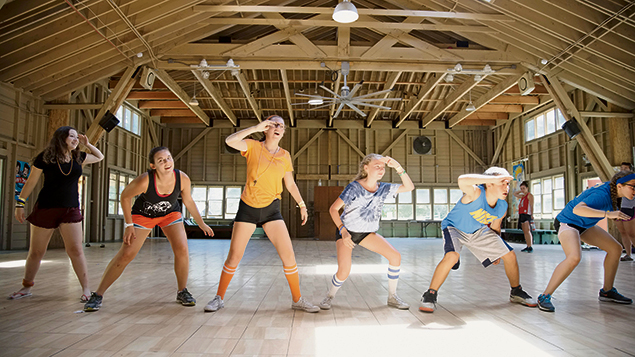
“That’s what the Bildners recognized back then — that Jewish camp has a power that other parts of the Jewish community didn’t necessarily recognize.”
Mr. Fingerman tells two stories, but it’s really one story, about connections.
“In early 2010, before I joined, a recruiter called me. Because the Bildner family owned Kings, and I was at Campbell Soups and then Manischewitz — I made the first certified kosher soup at Campbell, vegetarian vegetable soup — they had connections, and they called around.” They were in overlapping businesses.
And then of course there were the Jewish world connections. “They introduced me to Lisa Eisen, who is now the co-president of the Charles and Lynne Schusterman Foundation. They didn’t realize that we were in USY together. She was from Louisville and I was from Cincinnati; we were both in USY’s central region, CRUSY. And Eric Fingerhut, who was regional president of CRUSY before me, was president of Hillel and now of the Jewish Federations of North America,” and so they have overlapping interests and work together. (Mr. Fingerman also was international president of USY, a highly prestigious position for high-school seniors.) “It’s one of the wonderful things about working on a national scale. You run into people and reconnect with them.
“In camp, you build up a lifetime of friendships.” One of his closest friends came from Ramah Wisconsin. “Oh my God, it’s 50 years ago,” Mr. Fingerman said. “Rabbi Lee Buckman. He lives in Israel, and he’s still a very close friend.”
There’s a lesson in those names. “You make connections at camp, and those connections are sticky. They’re glue.” They’re with you for life.
“Kids need that more than ever,” he continued. “Before October 7, I said that we need it because kids have to get off screens.
“Now, the summer enrollment and staffing trends are very strong. It’s going very well. We think that it’s because camp is seen as a safe space, especially for college students,” who staff the camp and whose education is as important to camp leaders as the younger kids’ is. “College kids can leave the tension and drama on campus and come to a safe space. Yes, there will be discussions about the situation, but they are going to their second home in order to reconnect and recharge.
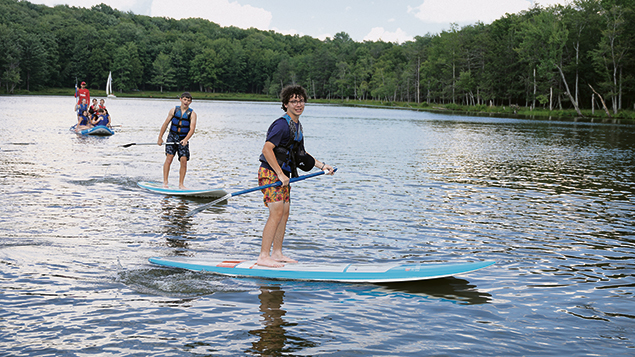
“Enrollment in Jewish camp has reached within a percentage point of prepandemic levels,” Mr. Fingerman said. “We think that this summer will be even stronger.”
One result of October 7 is likely to be a reduction in the number of shlichim, the Israeli counselors who make up a significant part of many Jewish camps’ staffs.
“We are working on contingency plans if some of them are still in the army,” he said. “How do we help camps overcome that?
“I think we usually get more than 1,500 shlichim from the Jewish Agency alone, and they connect the camp community to Israel.” He has more connection stories — when he was in Israel in December, his group went to help staff a barbecue for IDF soldiers near the Gaza border. “I met an officer, a reservist in the tank corps, who had been a shaliach in Camp Kinder Ring for eight years. He said he has four kids now, and he’s taken them to camp.
“And last Sunday, I was at a big dinner honoring the CEO of the federation there, Jacob Solomon, and I was sitting next to a woman who worked for the Jewish Agency. I told her that story — and it turned out that she knew him, because she had gone to that camp.” Everyone is connected, and everyone is connected to Israel, all through camp.
Toward the end of February, the FJC sent a group of nearly 50 professionals to Israel, in partnership with the Jewish Education Project. It’s also convening a summit on mental health issues at the Marlene Meyerson JCC in Manhattan this week. “Mental health issues have only become more pronounced because many camp communities have lost shlichim” in Gaza, Mr. Fingerman said. “Some were taken hostage; some have been released, some have been killed. The trauma has hit everyone.
“We have provided grants to 102 camps. That’s about a third of our network. We have given grants for at least three years of funding for an incremental health professional. That means that if you are a camp that has three mental health professionals, our grant allows you to have a fourth.”
All in all, looking at all the challenges that these last few terrible years have thrown at all of us, at the challenges inherent to growing up in this, our world, and to the extra challenges newly posed by growing up Jewish, we see that camp provides a refuge. A place where kids can grow, learn, laugh, and have actual, for-real fun.
Or, as Mr. Fingerman puts it, “Jewish camp works. It’s the connector. It’s the glue. It develops a strong Jewish identity. It develops leaders. It gives campers the independence, the skills, and the competency that are generic to all camps, and then you get the Jewish part on top.” It’s the icing on a particularly wonderful cake.
Co-Founders of Foundation for Jewish Camp Receive Distinguished Award for Excellence
Elisa Spungen Bildner and Rob Bildner bestowed with
American Camping Association’s Hedley S Dimock Award
[New Orleans, LA] – Foundation for Jewish Camp (FJC) proudly announces that its co-founders, Elisa Spungen Bildner and Robert “Rob” Bildner, have been awarded the distinguished Hedley S Dimock Award by the American Camp Association (ACA). The couple were honored for their extraordinary leadership, generous philanthropy, and significant impact on the field through the establishment of FJC, which now supports over 300 nonprofit day and overnight camps serving over 180,000 campers and young adults each summer. The award ceremony took place on Tuesday, February 6 at ACA’s National Conference in New Orleans.
The Hedley S Dimock Award holds a legacy of honoring trailblazers and their impact on camping, including noted thought-leader in positive youth development Dr. Christopher Thurber and renowned child psychologist Michael Thompson. These individuals have set a high standard for excellence, exemplifying outstanding dedication and innovation in their respective fields.
In 1998, Elisa and Rob established the Foundation for Jewish Camp with a mission to unify and galvanize the field and transform Jewish summer experiences. FJC is the only organization dedicated solely to expanding the reach of Jewish camp and deepening its impact, leveraging more than $15 million of philanthropic giving annually. Together, as co-founders and co-chairs of FJC’s Board of Trustees, Elisa and Rob’s work has been instrumental in advancing camp on the Jewish community’s educational and philanthropic agendas.
The couple have been recognized over the years for their longtime advocacy for Jewish camp when they received Hebrew Union College’s American Jewish Distinguished Service Award and the Jewish Funders Network’s Shapiro Prize for Excellence in Philanthropic Collaboration. Their impact extends beyond camping, showcased in their book “The Berkshires Farm Table Cookbook: 125 Homegrown Recipes from the Hills of New England”, a heartfelt tribute to local farmers and farm-to-table chefs.
Elisa graduated from Yale, Magna Cum Laude and Phi Beta Kappa, and also has a J.D. from Columbia University and a M.S. in Nutrition. She is a former lawyer, journalist and food company CEO, as well as a former journalism professor at Rutgers and New York Universities. She is the former chair of the Jewish Funders Network, president of JTA, the international Jewish news service, and is the current president of the Jewish Book Council. In 2013, President Obama appointed Bildner to the U.S. Holocaust Memorial Council.
Rob received his B.A. Magna Cum Laude from Yale, his J.D. from the University of Pennsylvania Law School and a master’s degree in Jewish studies from the Jewish Theological Seminary in New York and is a former lawyer and entrepreneur. Rob has long been an active and noted leader in Jewish communal life. He was a founding director and former treasurer of Repair the World, a national initiative seeking to engage young Jewish adults in community service, and currently serves on the boards of the Jewish Democratic Council of America and the Joseph Slifka Center for Jewish Life at Yale.
“We are extremely honored that the ACA has awarded us the Hedley S Dimock Award. Elisa and I began our journey to create the Foundation for Jewish Camp 25 years ago. Despite many headwinds and challenges, we were fortunate to gain so many advocates, friends, and supporters over the years. We are proud that FJC has made an enormous impact on the field of Jewish camp, campers, counselors, their families, and the broader Jewish community,” said Rob Bildner.
Elisa Spungen Bildner added, “We thank the ACA for recognizing the positive impact of our work on shaping the lives of young Jewish individuals, which we see as part of our collective effort to underscore the transformative power of camp. We value our continued collaboration and partnership.”
Empowering Growth
FJC’s Staff Retention Initiative Takes Center Stage in the Southeast
As the world changes, so does the outlook for summer camps. Foundation for Jewish Camp (FJC) and Southeast Regional Director, Bobby Harris, proudly unveil a groundbreaking Staff Retention Grant program. This initiative recognizes the unique challenges faced by Southeastern summer camps and adapts strategies to ensure the continuous success of these vital community institutions.
With the national staff retention rate dropping from 60% to a concerning 40% post-pandemic, FJC took proactive measure and talent innovation grants were awarded to camps nationwide in preparation for the summer of 2023.
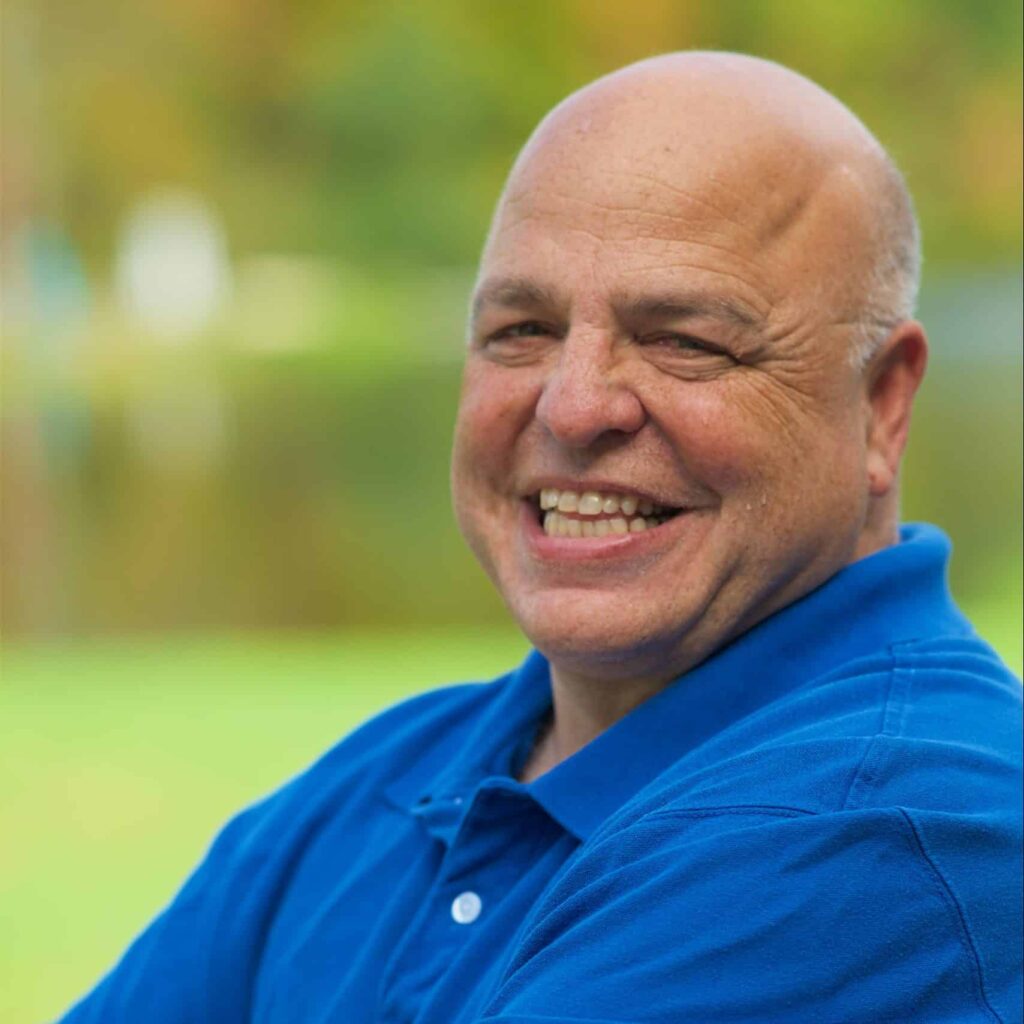
Bobby Harris explains, “The Southeast Staff Retention Initiative came to life in large part because of the ecosystem that we have been able to create in the Southeast. By having an FJC Regional Director and Center in the Southeast, we are able to keep our finger on the pulse on what is happening at our camps.”
A recent in-person conference with both camp professionals and Hillels marked the initiation of this innovative 3-pronged program. Camp professionals were exposed to field-wide staff retention initiatives, gained insights from professionals experienced in building organizational cultures and each camp was given the opportunity to submit a proposal for a $10,000 grant aimed at enhancing staff return rates.
Also in attendance at the conference, were representatives from Hillels from University of Florida, Florida State University, International Hillel, Hillels of Georgia, and Hillels of Broward/Palm Beach who collaborated with each camp, focusing on mutual understanding and improvement for their camps, their Hillels, and the Jewish engagement of their staff and campers.
For the Southeastern camps, FJC’s talent innovation grant is right on the money of societal changes and opens up a collaborative dialogue. With a targeted staff retention grant program providing essential tools to attract and retain talented staff these grants merge tradition and transformation. These grants help each camp continue their commitment to fostering a cohesive and thriving Jewish summer camp community.
Danny Herz, Executive Director of Camp Barney Medintz, expressed elation after receiving an FJC Talent Innovation grant stating, “FJC truly values our camps, and as importantly, the professional development of the professionals in the industry.”
For further information or inquiries, please contact: aimee@jewishcamp.org.
Pearlstone Hosts Healing Retreat for Israeli Families in Baltimore
REISTERSTOWN, MD – The weekend of November 10-12, 2023, was originally supposed to be quiet with a couple of small retreats at Pearlstone, located in Reisterstown, MD. But after war broke out in Israel, the executive staff at Pearlstone quickly realized their beautiful land, conference space and retreat lodging could serve as a space for solace and community-building. Pearlstone’s team jumped into action, engaging representatives from the Shinshinim Hub at Jewish Educational Services, the Foundation for Jewish Camp, and the Associated as partners. As headquarters of Adamah, North America’s largest Jewish environmental organization, Pearlstone’s response to this crisis sets the stage for replication at other Jewish retreat centers nationwide.
Ashley Pressman, Chesapeake Region Program Director at Pearlstone, felt honored to be able to organize and execute this retreat on such short notice. “There was so much demand that the retreat sold out in four days.” she said. “We realized how much local Israeli families needed an opportunity to gather and have a chance to begin the healing process, even as they are continuing to experience fear and trauma.”
Immediately upon arrival, guests were heard saying, “I didn’t realize how much I needed this.” Another guest commented, “before we arrived, we discussed how many of us felt alone – it is difficult for other friends in the US to understand how we feel.”
Immersed in a deeply Jewish, mostly Hebrew environment, gaggles of kids played together while adults felt comfortable enough to begin to release the acute stress and anxiety they’ve been holding for many weeks. They could exhale and recenter themselves through Hitbotedut (solo Jewish prayer in nature), connect and share stories on a night hike, sing and cry out together at Havdalah and around the campfire, and find powerful healing in the simple act of putting their hands upon the earth. Families loved Pearlstone’s farm animals, the PJ Library storybook walk, zipline, arts & crafts, delicious food, and more. There were trauma and healing discussions, lessons in kabbalah, and self-care activities such as yoga, tai-chi, and acupuncture.
“This weekend was definitely the highlight of my visit to the States at this time. The combination of nurturing, stillness, majestic nature, comradery, good food, spirituality, music, and the amazing abundance of Hebrew hit the spot!” exclaimed Rachelle Tehila Martin, who has been staying with relatives in Baltimore since leaving Israel after October 7.
“We’ve always believed in the power of Jewish retreating, but this gathering was on a different level of holiness. There is a deep yearning to be together right now and we will continue to meet this need.” said Jakir Manela, Adamah CEO.
Ruth Miller, Chief Planning Officer of The Associated Jewish Federation of Baltimore agreed, “It’s gratifying to see the way Pearlstone has gathered Israeli friends and families to promote healing, and to see yet another way Associated nonprofits support our Israeli sisters and brothers.”
Foundation for Jewish Camp helped make this powerful gathering possible, through the national family camp initiative, JFAM. “JFAM embraced a pivotal opportunity to provide essential funding and support to a program actively addressing the crisis in Israel,” says Michele Friedman, Director, New Camp Initiatives for Foundation for Jewish Camp. “We were happy to help aid the families experiencing heightened feelings of nervousness and isolation, during this challenging period.”
Pearlstone hosts three JFAM retreats each year in addition to hosting Jewish Holiday and Family Farm Camp retreats. To learn more about Pearlstone and see upcoming retreats, visit adamah.org/pearlstone.
Pearlstone is an Agency of The Associated Jewish Federation of Baltimore and the Headquarters for Adamah.
The Associated: Jewish Community Federation of Baltimore strengthens and nurtures Jewish life by engaging and supporting community partners in Greater Baltimore, Israel and around the world. For more information visit associated.org
Adamah cultivates vibrant Jewish life in deep connection with the earth, catalyzing culture change and systemic change through Jewish Environmental Education, Immersive Retreats, and Climate Action. JFAM family camps believe every Jewish family belongs at family camp and seeks to warmly welcome all family structures, families with members who do not identify as Jewish, families of all races, ethnicities, sexual orientations, gender identities, and families with children and/or adults with disabilities. For more information, visit jewishcamp.org/jfam
Foundation for Jewish Camp (FJC) is dedicated solely to expanding the reach and deepening the impact of Jewish summer camps. As central advocate and convener for the field, FJC scales financial support, programs, and resources benefiting over 300 nonprofit Jewish day and overnight camps that serve 180,000 young people across North America each summer. For more information, visit jewishcamp.org.
Unlocking the Positive Impact Summer Camps on Mental Health and Well-being
New Collaborative Research Reveals Key Insights for both staff and campers
[New York, NY] – With a rise in mental health affecting our youth a new study conducted in collaboration with the American Camp Association and researchers at Foundation for Jewish Camp, delved into the heart of what makes summer camp run: it’s staff and furthermore, what staff need to feel supported in a camp environment. The study offers valuable insights with potential relevance applicable to many types of summer camps and communities and uncovers the profound impact that well-being has on both campers and staff.
Every year, around 26 million American children attend summer camps, and about 1.5 million young adults and adults work at these camps. This study, which will be published in late October in The Journal of Youth Development publication, found key insights that revealed actionable takeaways for camp leadership, offering a blueprint for creating positive and successful camp experiences. It also found investing in the well-being of staff leads to better outcomes for all.
“The mental health and well-being of youth and young adults is a persistent concern in our current world,” Nila Rosen, Director, Learning & Research at Foundation for Jewish Camp, said. “Camps are a reflection of this complexity. Our research shows how to ensure that camps are supportive and thriving spaces for staff and campers.”
This research demonstrates how experiences of individuals in a group can impact others and emphasizes the importance of supporting staff and group leaders so they can create environments that foster growth and connection. These lessons extend to any organization or community seeking to enhance the well-being of its members.
For in-depth discussions on the study’s findings and their broader implications, the research team is available for interviews. Please contact: aimee@jewishcamp.org for more information.
About Foundation for Jewish Camp
FJC advocates for over 300 day and overnight camps that provide nearly 180,000 campers and counselors each summer with a meaningful, personal, and lifelong connection to Judaism. FJC is the only public 501(c)(3) charitable organization solely focused on Jewish camp. https://jewishcamp.org/
About American Camp Association
The American Camp Association (ACA) is the key to unlocking a future where all children thrive. ACA provides research, education, and training to promote safe and healthy camp experiences for all families. https://www.acacamps.org/
Foundation for Jewish Camp and JCAMP 180® Partner to Present the Jewish Camp Summit in December 2024
The joint event will be host to two established conferences and run from December 8-11, 2024.
October 24, 2023 – Foundation for Jewish Camp (FJC) and JCamp 180, a program of the Harold Grinspoon Foundation (HGF), are partnering to host a joint Jewish Camp Summit December 8-11, 2024. This event will be the first time the organizations will host their respective conferences—the annual JCamp 180 Conference and FJC’s biennial Leaders Assembly—consecutively and in a shared venue with intentional and collaborative planning.
“The Harold Grinspoon Foundation looks forward to the opportunity to bring together the entire Jewish camp community in one place to learn, network, and exchange ideas to advance the field,” says HGF President Winnie Sandler Grinspoon. “We look forward to being together with the entire camp community of professionals, lay leaders, and funders to meet the challenges of today and build for tomorrow.”
Jeremy J. Fingerman, CEO of FJC, adds that “Foundation for Jewish Camp was built on the values of collaboration and partnership—knowing that coming together as a field would benefit all camps. In line with this vision, we’re confident that coming together with JCamp 180 for The Jewish Camp Summit will better serve our camp leadership as we pave a trail toward a shared Jewish future.”
Jcamp 180 will kick off the joint event on Sunday, Dec. 8, 2024, with a full day of programming focused on camp governance issues as well as sessions on fundraising best practices. Then, Foundation for Jewish Camp’s 10th biennial Leaders Assembly will commence, with two full days of plenaries, sessions, networking, and off-site visits on a broad range of camp topics. While each of the two established conferences will retain its unique goals and formats, the two will share an overall theme and a joint reception in celebration of the entire field.
Sarah Eisinger, Director of JCamp 180, and Jamie Simon, Chief Program Officer of FJC, believe the Summit will contribute to sustaining Jewish camping for generations to come.
—
Contact:
Aimee Lerner, aimee@jewishcamp.org, 646-278 4518 (Foundation for Jewish Camp)
Brently Heilbron, bheilbron@hgf.org, 512-354-6984 (JCamp 180)
About Foundation for Jewish Camp:
Foundation for Jewish Camp (FJC) is dedicated solely to expanding the reach and deepening the impact of Jewish summer camps. As central advocate and convener for the field, FJC scales financial support, programs, and resources benefiting over 300 nonprofit Jewish day and overnight camps that serve 180,000 young people across North America each summer. For more information, visit www.jewishcamp.org.
About JCamp 180:
For more than 25 years, the Harold Grinspoon Foundation and its JCamp 180 program have been investing in the success of Jewish summer camps through grants, coaching, professional development programs and an annual conference. JCamp 180’s consultants train camp professionals and lay leaders on best practices for effective board governance, strategic planning, and fundraising, and the foundation has created a pipeline to camp through its PJ Library® program. JCamp 180 currently works with more than 150 overnight and day camps across North America. To learn more, visit www.JCamp180.org.
# # #


